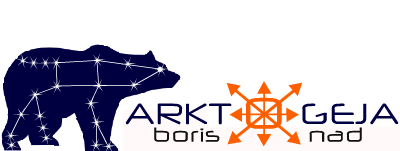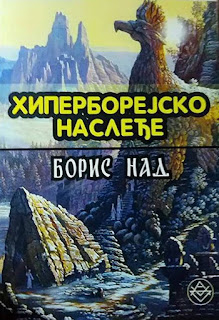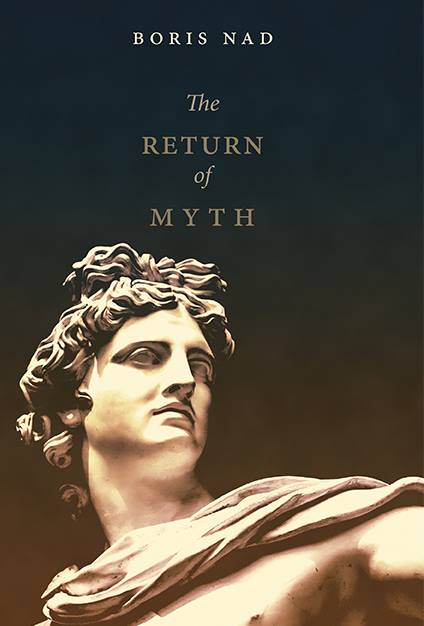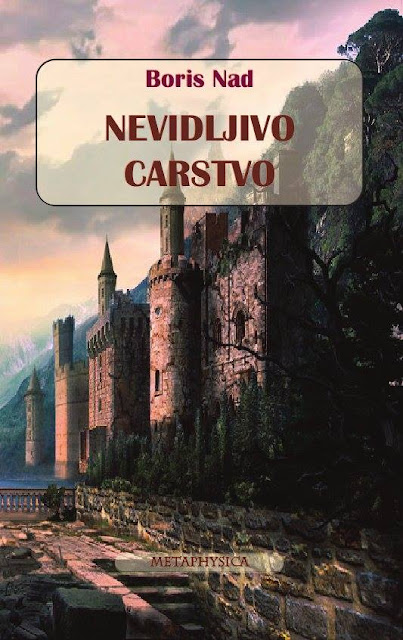The Serbian writer Boris Nad is known to the readers of Nortexa Culture Department through our exclusive translations of his solid and no-frills, treatment of mythical and historical subjects and literary short texts. But his books were previously available only in Serbian, and now with the appearance of “The Return of Myth” for the first time there is an English translation of his texts. This is reason enough to ask him some questions.” – Ruedi Strese
Questions by Ruedi Stres
(Interview originally published in German by Nortexa)
Dear Mr. Nad, first, congratulations for your first book in the English language!
Thank you for your congratulations. And a special thank you for this interview, which gives me the chance to address the German readers. It is a special pleasure, since, thanks to the efforts of Rudolf Strese, first translations of my texts have been already published in Germany.
Your book named “The Return of Myth“, has a title, that promises a lot. What is the reason for this title and how does it relate to the content of your book?
Myth, for us – except in special cases of extreme degradation and the secularization of tradition and culture – is not fiction for primitive people, superstition, or [a] misunderstanding. Instead it is a very concise expression of the highest sacred truths and principles, which are “translated” to a specific language of the worldly life, to as much of an extent as it is practically possible. Myth is sacral truth described by popular language. Opposing myth stands history. The writing “At the Wall of Time” by the German writer Ernst Jünger conveys the transition of myth into history, the moment in which the mythical consciousness dismisses [the] historical.
Modern culture is based on demythologization, which is a sort of persecution of [the] sacred from a desacralised culture. But, myths still always come back to the historical world. [The] sacred, of course, can not disappear. Mythical forces penetrate into what we call history, in this or that way, even in the form of [the] pseudo-mythology of modern times.
Now we are witnessing the collapse of the historic world. We are not able to consider all the implications of these changes. This is not a simple return to the time of “pre-history”, but something different and unnamed.
The book “The Return of Myth” opens up such questions, and in a way reactualizes mythic content in terms of a still desacralised culture as postmodern.
You are working in different genres. Poems, stories and short essays, which are nevertheless written in a literary manner. What kinds of texts are included in “The Return of Myth“?
In Serbia in 2010 a book with the same title was published. This is a comprehensive book, which contains over 300 pages and represents a kind of cross-section of my literary work. The book “The Return of Myth“, which has just been published in English, in Melbourne, by the publishing house Manticore Press, is a selection from that work and something more than that. This book – which was created in cooperation with an editor – is, in fact, one possible selection which includes poems, short stories and essays – all genres except for the novel.
The book is divided into three parts: “The Return of Myth”, “Symbols of Hyperborea” and “Stories and chronicles.”
In this book are very important mythical topographies. Some chapters are devoted to hyperborean myths, to the East and the West, to Land and Ocean, to order and chaos, to language as [the] discourse of beings, myth and tradition … Its actors are, among others, heroes and gods.
[These] can be viewed as a symptom: a symptom of weakening of historical and strengthening of mythical consciousness.
Which authors do you personally like most?
The list is very long, so that very choice [is] necessarily arbitrary.
For example, the accursed poets such as Novalis and Arthur Rimbaud. Russian classics, the classics of French literature, as Gustav Flaubert. There is also a Serbian epic poetry, which is usually attributed to Filip Visnjic, a kind of Serbian Homer. Homer. Serbian writers like Miloš Crnjanski, which in Germany, as far as I know, is not very well known.
German writer Ernst Jünger, who is also a writer and thinker. Then, a series of figures such as Rene Guenon, Julius Evola, thinkers who now belong to traditionalists.
After all, we can learn a lot not only from [the] good, but [also] less significant, not to say bad writers: if it does not need to do…
If I understood correctly, you are closely linked to the old Yugoslavian Avantgarde arts and music scene, NSK, Laibach etc. Can you tell us more about this?
I think you are right and that there is indeed a link between the Yugoslav Avant-garde and my literary work.
[In the] eighties, the former Yugoslavia had a strong, interesting and inspiring art scene. Mentioning two names: Laibach and Mizar. Mizar merging archaic and popular culture. Laibach are much more than a music band. Rather than on impacts, I’m talking about kinship. We could talk about the radiation (Strahlungen).
Laibach were, in my opinion, a fascinating and very important artistic phenomenon. Here, first of all, I think of the way they work, which is based on eclecticism and denying the originality, at least in the sense that this notion is given in modern art. (Originality, after all, etymologically means primordiality; in modern art, originality is just a market term.)
Laibach is the artistic concept. They use the language of politics and disturbing totalitarian aesthetics. I prefer to use the mythical content. Literature, after all, is based on a myth. This literature touches on a deeper reality and “dangerous intuitions” that are therein; he returned to the area inhabited by archetypes. And sacred geography and geopolitics are derived from the mythological notions and motives. Here are its roots and its deepest level. One of the basic and probably the oldest one is the conflict of sea creatures – Leviathan and land animal – Behemoth. But in both cases, there seem to be very deep archetypes.
Generally, you have a big interest in music and some of your poems were used as song lyrics…
I think that music is very important in poetry. Poetry relies on music.
The first such collaboration was a cooperation with the Italian music project Thulesehnsucht In Der Maschinenzeit – with Italian artist Solimano Mutti – who composed music for the text under the heading Ithaca. Its premiere was followed in Milan, in one industrial music festival in 2013.
Spanish band Suveran Vanguard recorded 25 Days of Gods. In the original, this is the Day of the Gods, a song that is a description of the Slavic funeral rituals, according to the notes left by the Arab traveler Al Masudi.
In cooperation [with] TSIDMZ, La Derniere Attaque and Sonnenkind – a German musical project, ie with Rudolf Seitner – a recording of the War Song (God of War) was created, dedicated to Baron Ungern-Sternberg, which was released in a compilation of the Eurasian Artistic Association: IV Revolution.
All these tracks can be found on a mini CD whose title Sailing to Itaca, was published in Germany in 2013, under the label Skulline.
I hope that there will be more of such cooperations. Some have been already agreed on and should be released soon.
There were plans to publish a periodical named “The New Antaios Journal”, following the tradition of the original Antaios Journal founded by Ernst Jünger and Mircea Eliade. What is the current status of this project?
That project, unfortunately, is in a standby mode, or a deep hibernation. It has been launched by the writer Thor Einar Leichhardt, a very significant author, who now lives and works in Northern Ireland. I have responded to his call for cooperation. The status of the project at this time does not depend on me; there are, presumably, personal reasons in question, or perhaps other current preoccupations. I hope it will be realized in the near future.
Soon your first book for the Croatian market will be published, too. Do you expect some success in Croatia?
I do not expect success, I try not to think in those categories. Each success is relative, is it not? For a start, I expect that the book will be accepted in good faith and without ill will. Even that would mean a lot. That is, in a sense, a tricky thing: a Serbian writer who presents himself in Croatia by a book translated into Croatian. Is this not the price we pay to our common history?
The previous question leads us to a political topic. How is the relationship between Serbs and Croats today? Are the wounds more important, or is there the consciousness of a common heritage and a common threat nowadays?
I think that the relationship is still bad, much worse than it could be.
In today’s Croatia the difference from its Eastern and orthodox neighbours is in every way emphasized. However, today some Croatian historians and linguists argue that the Croats and Serbs are one people (not nation). There are serious anthropological, historical, linguistic, and cultural arguments for it. We still speak the same language nowadays. These are facts that do not depend on the political conjuncture. And facts can not be ignored.
Unfortunately, the awareness of a common threat to both people, as a rule, is lacking. Croatia now insists on its affiliation to Central Europe – and not the Balkans. (However, Balkan is one of the sources of European culture; the heroes of the Homer’s Iliad were Balkans.) This is a legitimate position, if it does not disturb the continental stability. In geopolitical terms: Central Europe is legitimate if it is not opposed to the concept of the East – Eurasia. Otherwise, it is a path of destabilization. As you can see, this question is closely related to the relations between Russia / Eurasia and Central Europe / Germany. I think that precisely the geopolitical orientation of Germany is the key for continental security and prosperity: either orientation towards the United States (which is the case today), or towards Russia. There is no third possibility.
Serbia, though its current government largely bows down to EU/NATO demands, seems to be under permanent attack of atlanticist forces. What is happening in and around Serbia now in that regard, and why?
Yes, Serbia has been under permanent pressure of the atlanticist forces, not only in politics but also in culture, in economy, in any field. We are forced to accept Western models, but we do so reluctantly and under compulsion.
After all, Serbia has long resisted Western (American) hegemony, even military, during the NATO aggression. It is not surprising that it now feels a kind of fatigue. I believe that this is only a temporary condition.
However, the entire Balkan is still far from stability. Look at the situation in Macedonia, Montenegro, Bosnia and events in the Republic of Srpska… In fact, in the whole of the former Yugoslavia. In our opinion, new conflicts in the Balkans are not excluded, they are actually already under way, as in Macedonia, where a “colored revolution” is taking place according to the dictates of Washington.
How serious are the chances that Serbia will really break out of the Western power bloc and renew its old and much more natural alliance with its Orthodox brother state Russia?
Western policy does not enjoy much sympathy in Serbia. Serb sympathies are on the side of Russia today, and I believe that it is mutual. We are linked by very deep connections – ethnic, religious, cultural and historical. In this sense, Serbia can never become part of the Western bloc. It can be occupied, humiliated, probably divided, but only for a while. The Serbs have a saying: Each force for the (some) time.
This is confirmed by history. Such was the fate of the Roman Empire and the Byzantine Empire, the Ottoman Empire and the Habsburg Monarchy. Does anyone today seriously think that history will end with the American hegemony, and that the period of American dominance will last forever?
Alliance with Russia is necessary and natural, so this is, in our perspective, only a matter of time.
What do you expect in general regarding the relationship between Orthodoxy and Catholicism?
These relations have historically long been burdened by mutual rivalry and distrust. I must add: by the aggressive proselytism of the Catholic Church as well.
An awareness of the closeness has been absent, sometimes on both sides, which was the cause of many disasters that have struck the Christian world. We should take as an example a defeat of Byzantium, which changed the course of history in Europe. Today, we should bear in mind the fate of Christians in the Middle East, for example in Syria. I think that both – Catholicism and Orthodoxy – are now endangered.
A joint statement signed in Cuba by Russian Patriarch Kirill and Pope Francis leaves room for some hope, as the Pope renounced the Uniate church with that statement.
The communion of Christians is, in a word, a necessity, but not under the leadership of the Pope. It is unacceptable for the Orthodox population. Believing in the one Catholic and Apostolic Church, we must not forget that this church is Orthodox.
Can you tell us something about projects you are currently working at? What can we expect from you in the future?
Well, one idea is a book in German. I hope that this will in due course be realized.
Mr. Nad, thanks a lot for answering our questions!
Once again, thank you for this interview.
















KOMENTARI